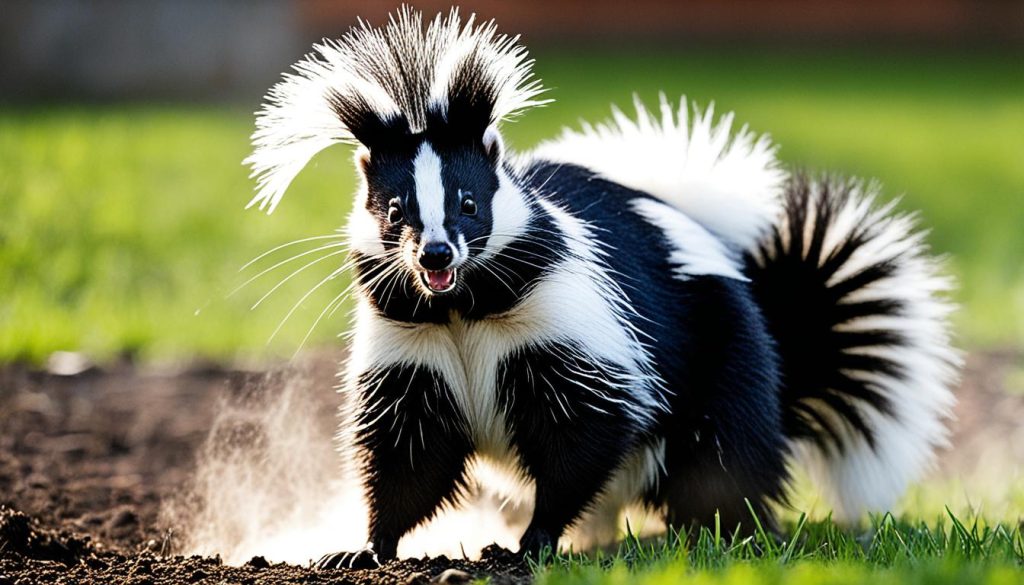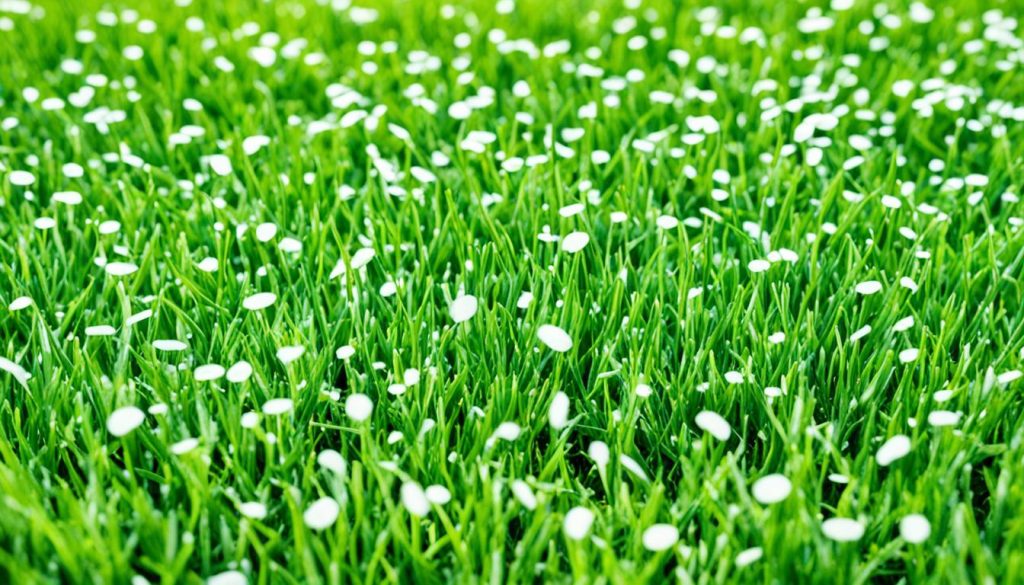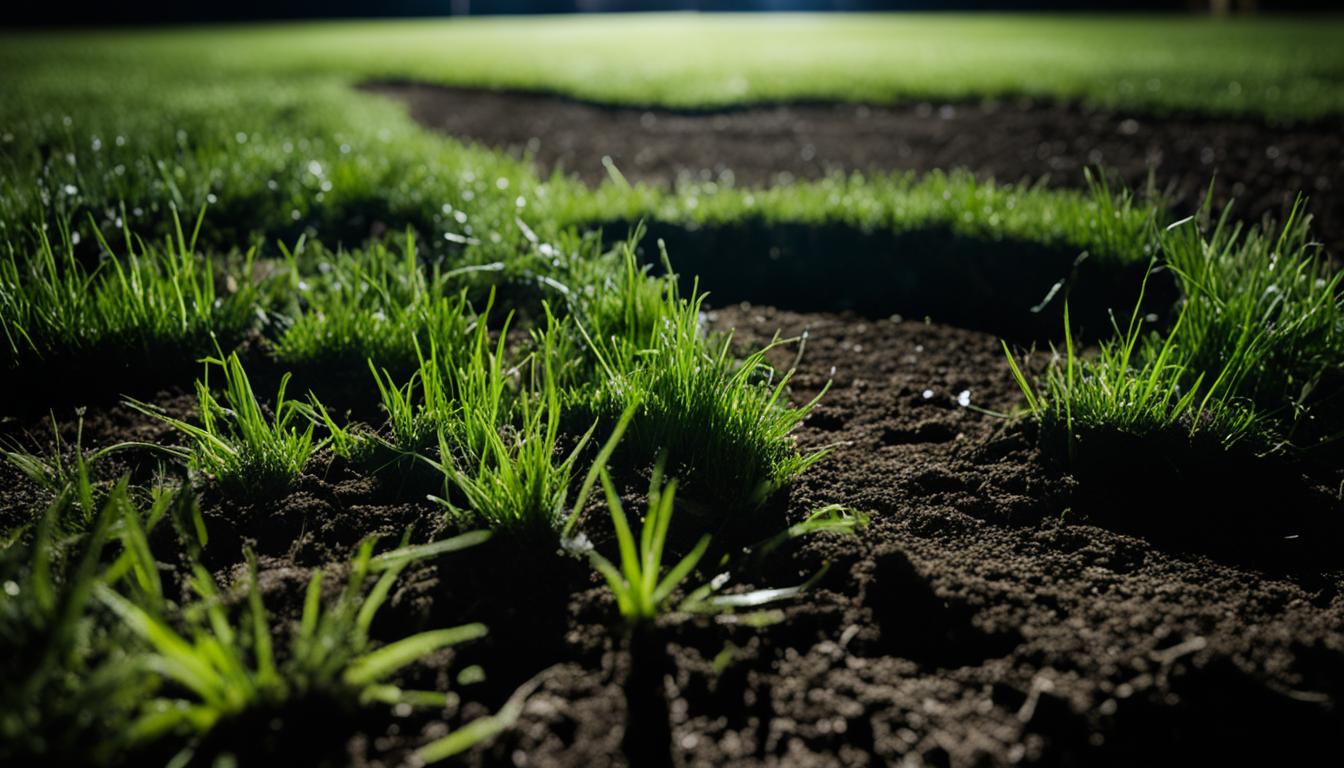Have you ever woken up to find your once-pristine lawn riddled with holes and torn-up turf? It can be a frustrating sight, but what exactly is causing this nighttime destruction? The answer may surprise you.
Many homeowners assume that it’s pests like raccoons, skunks, and rabbits that are behind the nocturnal lawn damage. While these animals are indeed common culprits, there may be other unexpected creatures digging up your yard under the cover of darkness.
In this article, we’ll dive into the world of nocturnal lawn diggers, explore their behavior, and provide you with effective strategies for preventing this nighttime destruction. So, let’s put an end to the mystery and regain control of your beautiful lawn!
Key Takeaways:
- Identify the specific pests causing nocturnal lawn damage.
- Prevent and mitigate the problem by understanding their behavior.
- Implement strategies to create a less appealing environment for these animals.
- Maintain a healthy lawn to minimize the risk of nocturnal lawn damage.
- Take prompt action to address the hazards of dug-up lawns.
Common Nocturnal Lawn Diggers: Raccoons and Skunks
Raccoons and skunks are common nocturnal animals that can cause damage to lawns by digging up the soil in search of food. Understanding their behavior and implementing preventive measures can help homeowners protect their yards.
1. Raccoons
Raccoons are known for their dexterity and intelligence. They use their front paws to pull up chunks of sod and flip them over in search of tasty grubs and other insects that live in the soil.
To prevent raccoon damage, homeowners can consider the following:
- Using repellent products: Applying repellents with foul-smelling ingredients, such as ammonia or citrus peels, can help deter raccoons from digging up the lawn.
- Securing garbage bins: Raccoons are opportunistic feeders and are attracted to trash bins. Ensuring that garbage bins are tightly sealed can help reduce their presence in the yard.
2. Skunks
Skunks are another nocturnal animal that can cause lawn damage. They make shallow holes in the lawn with loosened soil as they search for grubs and insects.
To prevent skunk damage, homeowners can consider the following:
- Using repellent products: Repellents with foul-smelling ingredients, such as ammonia or commercial skunk repellents, can be effective in deterring skunks from digging up the lawn.
- Erecting a fence: Installing a fence around the perimeter of the yard can help keep skunks out.
| Distinguishing Features | Raccoons | Skunks |
|---|---|---|
| Fur Color | Grayish-brown with a distinctive black mask across their eyes | Black with white stripes running down their back |
| Size | Medium-sized mammals, weighing up to 30 pounds | Medium-sized mammals, weighing around 7-14 pounds |
| Behavior | Curious and opportunistic feeders, often tipping over garbage bins in search of food | Predominantly nocturnal and shy, they spray a foul-smelling liquid when threatened |
By implementing these preventive measures, homeowners can reduce the likelihood of raccoons and skunks digging up their lawns at night and maintain a well-kept outdoor space.
Burrowing Animals: Rabbits
Rabbits are burrowing animals that can cause damage to lawns, often under the cover of night when they are less likely to be noticed. These small mammals are attracted to the lush grass and vegetation in yards, leading them to dig holes and create unsightly patches in the lawn. To prevent rabbit damage and maintain the beauty of your yard, there are several effective strategies you can employ.
Removing Food Sources
One of the first steps in deterring rabbits from your lawn is to eliminate potential food sources. Fallen fruits and vegetables can attract these creatures, so be sure to promptly clean up any produce that may have dropped to the ground. Additionally, consider trimming any vegetation that is too close to the ground, as rabbits are less likely to graze on short grass.
Installing Protective Fencing
Installing fencing around your yard can be an effective method of keeping rabbits out. Choose a fence with small openings near the ground, as rabbits can squeeze through small gaps. The fence should extend at least several inches below ground level to prevent rabbits from burrowing underneath.
Using Repellents
Repellents can also be employed to deter rabbits from digging in the lawn. Consider using products with strong scents, such as ammonia or predator urine, as these odors can make your yard less appealing to rabbits. Apply the repellent according to the manufacturer’s instructions, focusing on areas where rabbits have previously dug up the lawn.
By implementing these preventative measures, you can effectively deter rabbits from digging up your lawn at night. Removing food sources, installing protective fencing, and using repellents can contribute to maintaining a beautiful and damage-free yard.
Hazards of Dug-Up Lawns
Dug-up lawns can pose hazards for homeowners and their families. The holes and divots created by nocturnal animals can create an uneven surface, increasing the risk of tripping and falling. In addition, if animals dig too close to small trees or bushes, they can damage the plant’s roots, destabilizing it and potentially causing it to die.
To illustrate, consider the following hazards that dug-up lawns can present:
- Tripping hazards: When animals dig up lawns, they create holes and divots, making the surface uneven. This unevenness can be a tripping hazard, especially at night or in low-light conditions.
- Plant root damage: If animals dig too close to small trees or bushes, their roots can be damaged or destabilized. This can weaken the plants and make them more susceptible to disease or death.
It’s essential for homeowners to address lawn damage promptly to minimize these hazards and maintain a safe outdoor environment. Regular inspections of the lawn should be conducted to identify any areas that require attention, such as filling in holes or repairing damaged plant roots.
Here is a visual representation of the hazards of dug-up lawns:
| Hazards | Description |
|---|---|
| Tripping hazards | An uneven lawn surface increases the risk of tripping and falling. |
| Plant root damage | Digging too close to small trees or bushes can damage their roots, potentially causing them to die. |
Understanding Skunk Behavior and Spray
Skunks are nocturnal animals that can cause damage to lawns while foraging for food. Their spray is a defense mechanism used when they feel threatened or cornered. Skunks will try to escape or intimidate potential threats before resorting to spraying.
To discourage skunks from your yard, it’s important to avoid frightening them and making them feel threatened. Repellent products with strong scents like ammonia or commercial skunk repellents can be effective deterrents. It’s important to use these products carefully as they can also make the yard unpleasant for homeowners.
| Skunk Deterrents | Pros | Cons |
|---|---|---|
| Ammonia |
|
|
| Commercial Skunk Repellents |
|
|
By taking proactive measures to discourage skunks from your yard, you can minimize the risk of damage to your lawn and prevent unpleasant encounters with these nocturnal animals.

Effective Ways to Keep Skunks Away
Erecting a fence around the perimeter of the yard is one of the most effective ways to keep skunks out. Skunks are not skilled climbers, so a well-constructed fence with no gaps or holes should deter them. Additionally, removing potential food sources, such as bird feeders or fallen fruits, can make the yard less attractive to skunks. Using motion-activated sprinklers can also startle and deter skunks from entering the yard.
To skunk-proof your yard, consider implementing the following strategies:
- Install a sturdy fence: Skunks are not talented climbers, so a fence that is at least 3 feet high and buried several inches below the ground surface will prevent them from accessing your yard. Avoid leaving any gaps or openings that skunks can squeeze through. Make sure the fence is made of sturdy material, such as metal or solid wood, to withstand skunk attempts to dig or chew their way in.
- Remove attractants: Skunks are opportunistic feeders and can be attracted to potential food sources in your yard. Secure bird feeders, pet food, and garbage bins to prevent easy access for skunks. Clean up fallen fruits and vegetables regularly, as these can also attract them.
- Utilize motion-activated sprinklers: Skunks are startled by sudden bursts of water, making motion-activated sprinklers an effective deterrent. Place these sprinklers in areas where skunks are likely to enter your yard, such as near entrances or potential burrow sites. The sudden spray of water will discourage skunks from venturing further into your property.
By implementing these skunk-proofing strategies, you can significantly reduce the chances of skunk intrusion into your yard and minimize the potential for damage and odor caused by these nocturnal creatures.
Pros and Cons of Skunk-Proofing Methods
| Skunk-Proofing Method | Pros | Cons |
|---|---|---|
| Fencing | – Highly effective in keeping skunks out – Provides a physical barrier – Can be a long-term solution |
– Requires initial investment – May obstruct yard aesthetics |
| Removing attractants | – Reduces skunk interest in the yard – Helps maintain overall cleanliness |
– Requires regular maintenance – May not completely eliminate skunk presence |
| Motion-activated sprinklers | – Startles and deters skunks – Targets specific areas of the yard |
– Requires water source and setup – May accidentally activate with non-targeted animals |
Identifying Raccoon Behavior
Raccoons are nocturnal animals that can cause damage to lawns and gardens. Understanding their behavior patterns is key to preventing raccoon damage and maintaining a beautiful yard.
Signs of Raccoon Presence
There are several signs that can indicate the presence of raccoons in your yard:
- Overturned turf: Raccoons use their front paws to pull up chunks of sod in search of insects like grubs.
- Damage to plants: Raccoons may dig up plants and flowers in their search for food.
- Scattered trash in garbage bins: Raccoons are opportunistic scavengers and may rummage through garbage bins for food.
By recognizing these signs, homeowners can take proactive steps to prevent further raccoon damage to their yard.
Raccoon Behavior Patterns
Raccoons are attracted to areas with abundant food sources, including grubs, worms, and other insects. They are also known to forage in trash cans and compost bins for leftover food. These versatile creatures are agile climbers and good swimmers, allowing them to access various parts of a property.
Furthermore, raccoons are potential carriers of rabies, making their presence a concern for pets and humans. Taking steps to discourage raccoons from your yard helps promote safety for all.
Preventing Raccoon Damage
To prevent raccoon damage and make your yard less appealing to these creatures, consider the following measures:
- Remove food sources: Ensure garbage bins have secure lids, and avoid leaving pet food or unattended compost piles in your yard.
- Secure garbage bins: Use raccoon-proof garbage cans or attach bungee cords to secure lids.
- Garden protection: Use fencing or netting to protect vulnerable plants and flowers from raccoon foraging.
- Outdoor lighting: Install motion-activated lights or use deterrent devices like strobe lights or radios to disrupt raccoon activity.
Implementing these preventive measures can help deter raccoons from causing damage to your yard and maintain a beautiful outdoor space.
What To Do If You Spot a Raccoon in Your Yard
If you happen to spot a raccoon in your yard, it’s important to exercise caution and avoid approaching the animal. Raccoons, like many other wild animals, can carry diseases such as rabies and may become defensive or aggressive if they feel threatened.
If you suspect that a raccoon in your yard may be displaying unusual behavior or could potentially have rabies, it is best to seek assistance from a professional wildlife control service or contact your local authorities. They have the expertise and experience to safely handle the situation and provide appropriate guidance on raccoon control measures.
Dealing with raccoon presence requires expert knowledge and the use of effective wildlife control methods. By relying on professional assistance, you can ensure the safety of both yourself and the raccoon, while also implementing appropriate measures to prevent further raccoon damage.
The Role of Grubs in Lawn Damage
Grubs, the larvae of beetles, are lawn pests that reside in the soil beneath the grass. These pesky creatures feed on the grassroots, leading to unattractive brown patches and weakened turf. The damage caused by grubs can make your lawn susceptible to further destruction by other animals, such as raccoons and skunks, that are attracted to areas with high grub populations.
Preventing lawn damage caused by animals digging for grubs requires addressing the grub problem. There are several methods for grub control that homeowners can employ:
- Natural methods: One natural approach is to introduce beneficial organisms into the soil. Nematodes, microscopic parasites, can be applied to the lawn. These parasites enter the grub’s body and release bacteria that kill them. Another natural method is using milky spore, a bacterial disease specific to grubs. It creates an inhospitable environment for grubs in the soil, reducing their populations over time.
- Chemical treatments: Chemical options for grub control include products that kill existing larvae or prevent future generations. These treatments are effective in reducing grub populations and protecting your lawn from damage caused by grubs. However, it’s important to carefully follow the instructions and use these products responsibly, as some chemicals can harm beneficial insects and pose risks to humans and pets.
By implementing grub control methods, you can safeguard your lawn from the destructive actions of grubs and the animals they attract. This proactive approach will help maintain a healthy and beautiful yard.
Pros and Cons of Grub Control Methods
| Grub Control Method | Pros | Cons |
|---|---|---|
| Natural Methods (Nematodes) |
|
|
| Natural Methods (Milky Spore) |
|
|
| Chemical Treatments |
|
|
It’s crucial to assess the pros and cons of each method before deciding on the best approach for your lawn. Consider factors such as environmental impact, effectiveness, and long-term control when choosing a grub control method. With proper action, you can prevent lawn damage caused by grubs and keep your yard in excellent condition.
Natural and Chemical Methods for Grub Control
When it comes to controlling grubs in your lawn, there are both natural and chemical options available. Each method has its pros and cons, so it’s important to consider your specific needs and preferences.
Natural Grub Control Methods
Natural methods for grub control offer an environmentally friendly approach to managing these pests. Two common natural methods include the use of nematodes and milky spore.
Nematodes: Nematodes are microscopic parasites that enter the grubs’ bodies and release bacteria that kill them. These beneficial organisms are safe for humans, pets, and plants, making them a popular choice for those seeking natural solutions. However, nematodes may take several years to become fully effective, as they need time to establish a population in the soil.
Milky Spore: Milky spore is a biological control that creates an inhospitable environment for grubs in the soil. It contains a bacterium called Bacillus popilliae, which kills grubs but is harmless to other organisms. Milky spore is applied to the lawn and continues to multiply, providing long-term control. However, it can take one to three years to establish a sufficient population and may not be suitable for those seeking immediate results.
Chemical Grub Control Products
Chemical products for grub control offer a quicker and more direct solution for eliminating these pests. There are various insecticides available that kill existing larvae or prevent future generations.
Pros: Chemical treatments can provide fast and effective control, helping to manage a severe grub infestation. They can also be convenient to use, as many products are available in ready-to-spray or granular form. Additionally, chemical control methods may offer immediate results, making them suitable for homeowners who need a quick fix.
Cons: Chemical grub control products can have some drawbacks. They may harm beneficial insects, such as earthworms and bees, which play important roles in maintaining a healthy ecosystem. Additionally, some chemicals can pose risks to humans and pets if not used according to the instructions. It’s crucial to follow the manufacturer’s guidelines and consider the potential impacts on the environment and your household.
Comparison of Natural and Chemical Grub Control Methods
| Natural Grub Control Methods | Chemical Grub Control Products |
|---|---|
| – Environmentally friendly | – Fast and effective |
| – Safe for humans, pets, and plants | – May harm beneficial insects |
| – Long-term control | – Potential risks to humans and pets |
| – May take several years to become fully effective | – Convenient and easy to use |
Ultimately, the choice between natural and chemical grub control methods depends on your preferences, the severity of the grub infestation, and the timeframe in which you need to address the problem. It’s important to weigh the pros and cons of each method and consider the potential impacts before making a decision.

Tips for Preventing Animal Digging in Your Yard
Preventing animal damage to your yard and maintaining a healthy lawn can be achieved by implementing effective strategies. Here are some tips to help you prevent animals from digging up your yard at night:
- Maintain a healthy, well-rooted lawn: A healthy lawn is not as appealing to nocturnal animals because it is harder for them to dig. Regularly water, fertilize, and mow your lawn to keep it in good condition.
- Use deterrents: Consider using natural deterrents such as red pepper flakes, which can irritate animals and discourage them from digging. Another option is predator urine, which creates an illusion of danger and keeps animals away.
- Cover vulnerable areas: Protect areas that are prone to digging by covering them with chicken wire or mesh. This prevents animals from accessing the soil and causing damage.
- Eliminate food sources: Animals are often attracted to yards that provide easy access to food. Remove fallen fruits, vegetables, and bird feeders to discourage nocturnal animals from foraging in your yard.
- Remove potential shelter options: Clear away brush piles, woodpiles, and any other potential hiding spots for animals. By eliminating shelter options, you make your yard less inviting to nocturnal visitors.
By following these tips, you can create an inhospitable environment for animals, preventing nocturnal digging and maintaining a healthy lawn. Remember to implement proper lawn care practices and utilize deterrents strategically to maximize the effectiveness of these preventive measures.
Conclusion
Nocturnal lawn damage caused by animals digging can be a frustrating problem for homeowners. However, by understanding the behavior and needs of the specific animals causing the damage, effective preventive measures can be taken. Creating a less appealing environment for these animals by removing food sources and potential shelter options is an important first step.
Using deterrents, such as foul-smelling ingredients or motion-activated sprinklers, can help discourage animals from digging up the lawn. Additionally, maintaining a healthy lawn through proper care and maintenance practices, like regular watering, mowing, and fertilizing, can make the yard less attractive to these nocturnal visitors.
By implementing these strategies for animal control and preventing nocturnal lawn damage, homeowners can maintain a beautiful yard while minimizing the risk of animal-inflicted damage. Consistent effort and attention to detail will go a long way in preserving the integrity and beauty of the outdoor space.





